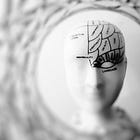Reflexivity: The Consciousness of Oneself
Reflexivity allows us to gain insight into our own behaviours, motivations, and beliefs, aiding us in the self-love journey.
In the journey towards self-love and personal growth, there is a powerful concept that often goes unnoticed but plays a pivotal role in our transformation: reflexivity. Rooted in the depths of psychology and philosophy, reflexivity is a concept that encourages us to examine our thoughts, feelings, and actions in a self-aware and introspective manner. It allows us to gain insight into our own behaviours, motivations, and beliefs, ultimately aiding us in fostering self-love and healing.
While I considered myself to be self-aware, the use of psychedelics and my masters programme in transdisciplinary practice have propelled my reflexive mind into another dimension. I now do not take every thought I have as gospel and almost always try to trace it back to why I think the way I do. In this article, I will delve into the origins of reflexivity, its importance in the journey towards self-love, and how you can become more reflexive in your daily life.
The Origins of Reflexivity
George Herbert Mead, a renowned sociologist, philosopher, and social theorist, first coined the term "reflexivity." Reflexivity refers to the ability of individuals or groups to reflect upon and analyse their own actions, thoughts, and beliefs. In essence, reflexivity involves thinking about one's thinking or examining one's own experiences and behaviours in an introspective and self-aware manner.
Key points about reflexivity include:
Self-Awareness: Reflexivity involves being aware of one's own thoughts, emotions, and actions. It's a process of introspection where individuals consciously consider their own behaviour and its implications.
Critical Self-Examination: It encourages individuals to critically examine their own beliefs, assumptions, and biases. This self-examination can lead to a deeper understanding of one's motivations and perspectives.
Social Interaction: Reflexivity often takes place in the context of social interaction. It acknowledges that our interactions with others shape our sense of self and identity in part.
Change and Adaptation: By reflecting on their own actions and beliefs, individuals may be more open to change and adaptation. They can adjust their behaviours and attitudes based on their self-awareness and self-analysis.
Why Reflexivity Matters in Self-Love
Reflexivity prompts us to engage in introspection and self-examination. It encourages us to explore our thoughts, emotions, and behaviours, leading to a deeper understanding of ourselves. Self-awareness is a crucial first step towards self-love, as it allows us to identify areas where we need healing and growth. The reflexive mind is able to challenge negative beliefs we hold about ourselves and ultimately challenge the validity of such thoughts. Further, being reflexive enhances connection with others. By understanding how our actions affect others, we can develop empathy and forge deeper connections with those around us.
Psychedelics can be used as a tool to bring reflexivity into the front of your mind, but it’s perfectly possible to exercise reflexivity without them. I guess it depends on how stubborn your mind is in wanting to be right or have the dominant opinion; in which case, these types of individuals fear psychedelics or a ‘bad trip’ in the case of a forced alternative opinion.
On a personal level, psychedelics brought the obvious into my peripheral and enhanced my ways of knowing. They allowed me to face my demons and insecurities and slowly pick them apart to find the root cause of the problem. For example, rather than just accepting that I have suicidal thoughts or engaging in numbing behaviours that fuelled my body dysmorphia, I fostered reflexivity to become self-aware of why I think the way I do, often tracing thoughts back to childhood trauma. It seems psychedelics work to dissolve the boundaries between the conscious and unconscious mind, parking the ego for a bit to confront deeply buried thoughts and emotions, complementing the introspective nature of reflexivity.
How you can explore your own reflexivity
Examining one's own reflexivity involves engaging in introspective practices that encourage self-awareness and self-analysis. Here are some exercises that can help you develop and enhance your reflexivity:
Journaling: Regular journaling is a powerful tool for reflection. Set aside time each day or week to write about your thoughts, feelings, and experiences. Explore your reactions to different situations and identify recurring patterns in your behaviour and emotions. With each behaviour or core thought about yourself, try to trace back to why you think the way you do.
Mindfulness Meditation: Mindfulness meditation involves paying focused attention to the present moment without judgement. This practice can help you become more aware of your thoughts, emotions, and bodily sensations. It's a valuable exercise for cultivating self-awareness.
Self-Questioning: Ask yourself open-ended questions that encourage introspection. For example, "Why do I feel this way?" or "What motivated me to make that decision?" Explore your answers in depth to gain insights into your thought processes and motivations.
Feedback Seeking: Seek feedback from trusted friends, family members, or mentors about your behaviour and interactions. Listen attentively and reflect on their perspectives. This external feedback can provide valuable insights into your self-concept and how others perceive you.
Visual Self-Exploration: Create a visual representation of your thoughts and emotions. This could be in the form of a mind map, a mood board, or even artwork. Visualising your inner world can help you gain a different perspective on your feelings and beliefs.
Role Reversal: Put yourself in the shoes of someone else, whether it's a friend, colleague, or family member. Imagine how they might perceive your actions and words. This exercise can help you gain empathy and a more objective view of your behaviour.
Self-Compassion Practice: Practice self-compassion by treating yourself with the same kindness and understanding you would offer to a friend. When you face challenges or make mistakes, acknowledge them without harsh self-criticism.
Developing reflexivity is an ongoing process. It requires patience, self-compassion, and a commitment to understanding yourself on a deeper level. These exercises act as a tool to help you become more self-aware, supporting your self-love journey. The point is not to forgo the emotional aspect of pain but your healing journey needs to have an element of addressing why you think and behave the way you do.








